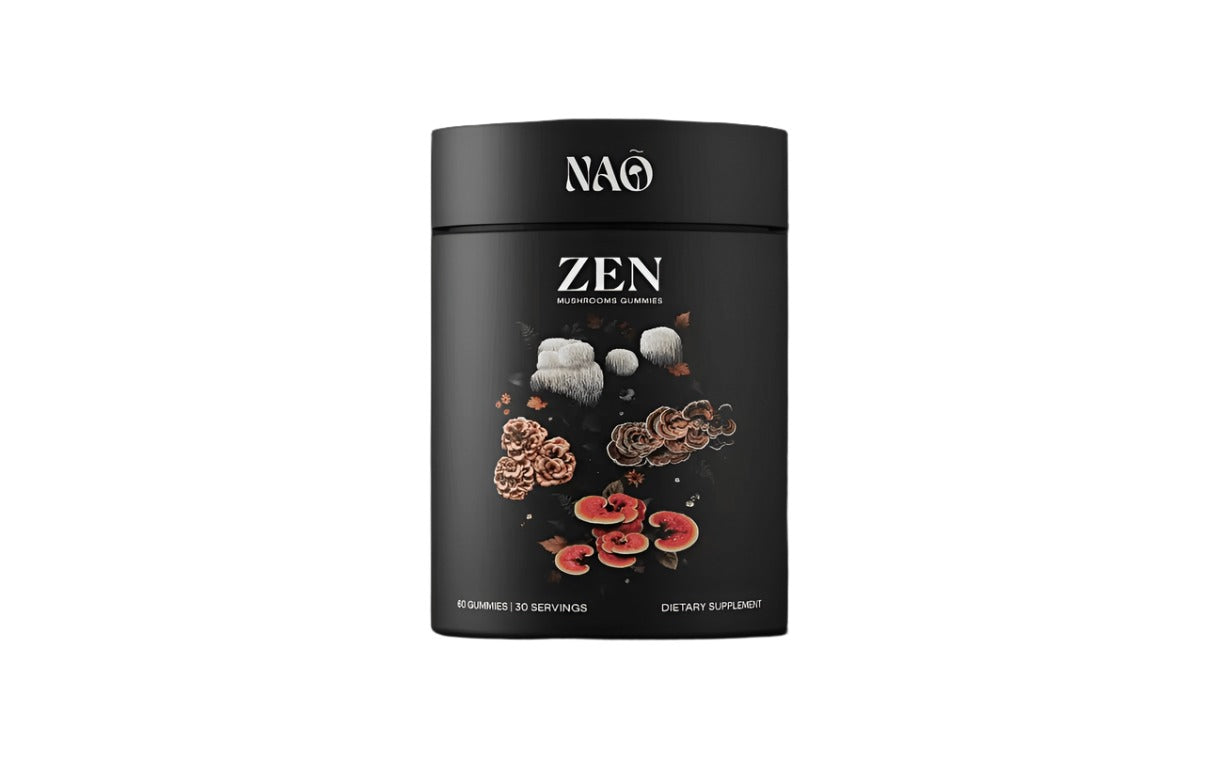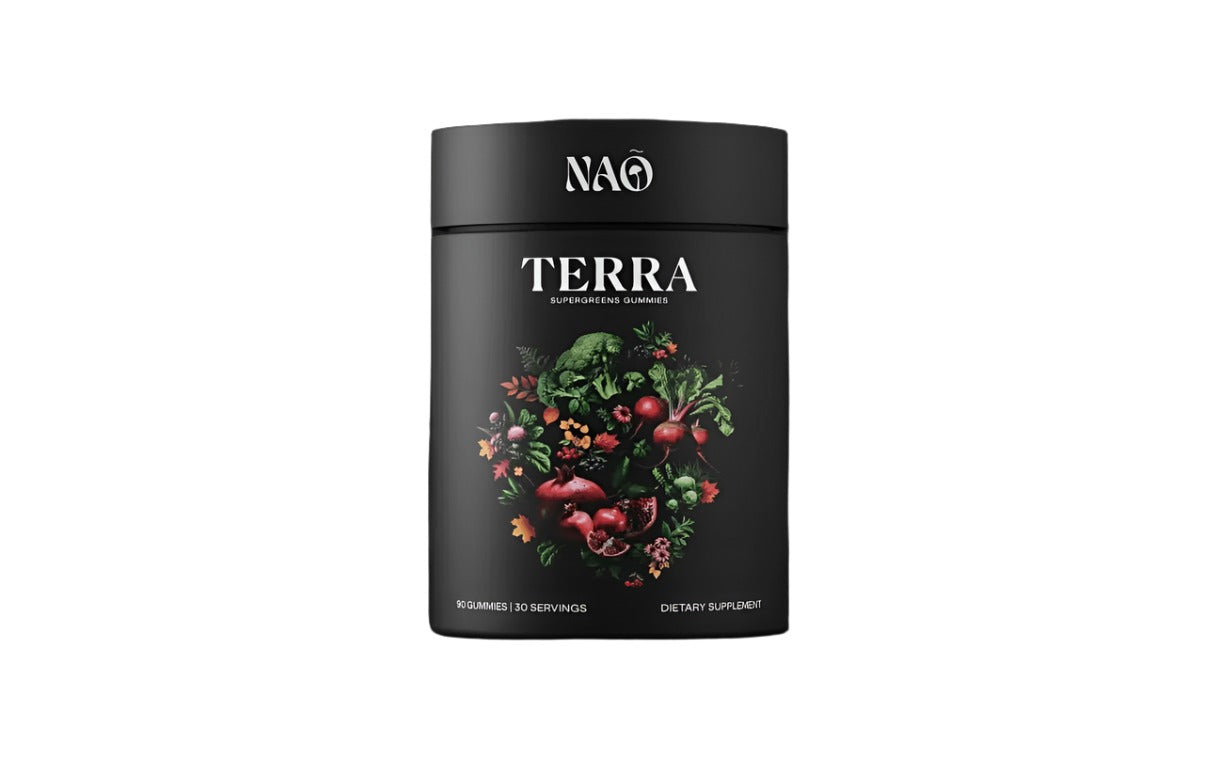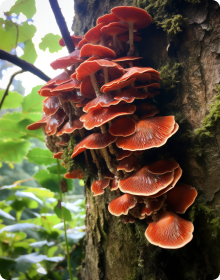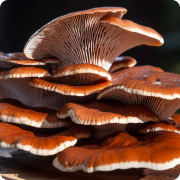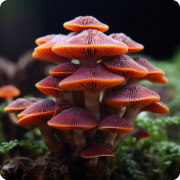Cordyceps mushroom — Source of the Energy
Nestled within the intricate tapestry of the fungal kingdom lies a group of remarkable organisms known as Cordyceps mushrooms, captivating both the realms of science and traditional medicine. This text is dedicated to the cordyceps mushrooms and everything that is related to them.
Definition and Overview of Cordyceps Mushrooms
Cordyceps, derived from the Greek words meaning "club" and "head," encompasses a genus of fungi renowned for their unique parasitic lifestyle, targeting insects and arthropods. Yet, beyond their entomopathogenic prowess, Cordyceps mushrooms have woven a rich history deeply intertwined with traditional cultures and herbal practices.
Cordyceps mushrooms, with their elongated fruiting bodies, stand as silent witnesses to a fascinating ecological dance between fungus and host. These mushrooms belong to the Cordyceps genus, a diverse family that includes various species with distinct properties and potential health benefits.The hallmark of Cordyceps mushrooms lies in their ability to parasitize insects, ultimately leading to the formation of unique fruiting bodies. These fungal structures, emerging from the deceased hosts, house the spores that perpetuate the life cycle of Cordyceps. As science delves deeper into the biochemistry and pharmacology of these fungi, the potential applications for human health continue to unfold.
Historical Use and Traditional Significance
Venture into the annals of traditional medicine, and you'll find Cordyceps mushrooms occupying a revered place, particularly in the tapestry of traditional Chinese medicine (TCM). With roots reaching back over a millennium, Cordyceps sinensis, also known as "winter worm, summer grass," has been a stalwart companion in the holistic approach to health.
In the ancient traditions of TCM, Cordyceps mushrooms were treasured for their purported ability to fortify the respiratory system, boost immune functions, and infuse vitality into the weary. The rarity of these mushrooms in the wild once made them a symbol of exclusivity and luxury, reserved for emperors and nobility.
In the modern era, the allure of Cordyceps mushrooms has transcended cultural boundaries. As cultivation methods have evolved, so too has accessibility, making these fungi a subject of interest not only in traditional medicine but also in contemporary wellness and sports nutrition.
Understanding Cordyceps Mushrooms
Cordyceps mushrooms exhibit distinct morphological features that aid in their identification. The fruiting body, which emerges from the insect or arthropod host, typically takes on an elongated, club-like shape. The coloration of the fruiting body can vary among species, ranging from shades of orange and brown to pale hues. Microscopically, the spores of Cordyceps can also differ, contributing to the taxonomy of individual species.
One notable characteristic is the parasitic nature of Cordyceps, as it infects and ultimately consumes its host. This unique lifestyle sets Cordyceps apart in the fungal kingdom, creating a captivating interplay between fungus and insect.
Natural Habitat and Cultivation
Cordyceps mushrooms have historically been found in specific regions with particular environmental conditions. Many species are native to the high-altitude regions of the Himalayas, Tibetan Plateau, and other mountainous areas. These environments provide the optimal conditions for the fungus to parasitize insects and complete its life cycle.
In recent years, advancements in cultivation techniques have enabled the controlled production of Cordyceps mushrooms, reducing the reliance on wild harvesting. Cultivation typically involves mimicking the natural conditions conducive to Cordyceps growth. Specialized substrates, temperature control, and humidity levels are carefully managed to replicate the fungus's preferred habitat.
This shift towards cultivation has not only increased the availability of Cordyceps mushrooms but also contributed to sustainable practices, minimizing the environmental impact of wild harvesting.
Bioactive Compounds in Cordyceps
Cordyceps mushrooms are esteemed not only for their unique lifestyle but also for the array of bioactive compounds they contain. These compounds contribute to the potential health benefits associated with Cordyceps. While the exact composition can vary among species, some common bioactive compounds found in Cordyceps mushrooms include:
- polysaccharides;
- adenosine;
- cordycepin;
- sterols and amino Acids.
Understanding the bioactive compounds within Cordyceps mushrooms provides a foundation for exploring their potential therapeutic applications and contributes to the growing body of research surrounding these enigmatic fungi.
Energy-Boosting Benefits of Cordyceps Mushrooms
The very essence of using cordyceps mushrooms for human's health mostly lies into energy sphere because of several aspects.
Increased ATP Production
Adenosine triphosphate (ATP) serves as the primary energy currency in cells, providing the energy needed for various cellular processes. Cordyceps mushrooms have been associated with an increase in ATP production, which can contribute to enhanced energy levels. The bioactive compounds found in Cordyceps, particularly adenosine and cordycepin, are believed to play a role in promoting ATP synthesis, aiding in cellular energy metabolism.
Enhanced Oxygen Utilization
Cordyceps mushrooms are thought to enhance the body's ability to utilizeoxygen efficiently. This can be particularly beneficial for physical performance, as oxygen is crucial for the production of ATP through aerobic respiration. Improved oxygen utilization can lead to enhanced endurance, reduced fatigue, and optimized energy production during activities that demand sustained effort.
Improved Mitochondrial Function
Mitochondria, often referred to as the powerhouse of the cell, are responsible for generating energy in the form of ATP. Cordyceps mushrooms are believed to support mitochondrial function, potentially optimizing the energy-producing capacity of these cellular organelles. By promoting mitochondrial efficiency, Cordyceps may contribute to improved overall energy levels and vitality.
Adaptogenic Properties for Stamina
Cordyceps mushrooms are classified as adaptogens, a category of natural substances that help the body adapt to stressors and maintain balance. In the context of energy and stamina, Cordyceps is suggested to support the body's response to physical and environmental stress, helping to maintain optimal energy levels during challenging situations. This adaptogenic quality can be particularly beneficial for athletes and individuals engaged in physically demanding activities.
The adaptogenic properties of Cordyceps are thought to modulate the body's stress response, including the regulation of cortisol, a hormone associated with stress. By promoting a balanced stress response, Cordyceps may contribute to sustained energy levels without the peaks and crashes often associated with other energy-boosting substances.
Active elements of Cordyceps Mushrooms
Active Components of Cordyceps Mushrooms include:- Cordycepin, also known as 3'-deoxyadenosine, has a structure similar to adenosine, a fundamental component of ATP, the primary energy currency in cells. Cordycepin has been the focus of research due to its potential antifungal, antiviral, and anticancer properties. It may also play a role in promoting ATP synthesis, contributing to increased energy levels. Additionally, cordycepin has demonstrated anti-inflammatory effects, adding to its potential therapeutic applications.
- Polysaccharides are complex carbohydrates composed of multiple sugar molecules linked together. Cordyceps mushrooms are rich in polysaccharides, and the specific composition can vary among species. Polysaccharides from Cordyceps are often associated with immune-modulating effects. They may support the body's immune system by influencing various immune cells and responses. Additionally, polysaccharides contribute to the overall nutritional profile of Cordyceps mushrooms.
- Adenosine is a nucleoside composed of adenine and ribose, forming a key part of ATP. It is found in various tissues and plays a crucial role in cellular energy metabolism. Cordyceps mushrooms contain adenosine, and its presence has been linked to potential cardiovascular benefits. Adenosine has vasodilatory effects, helping to widen blood vessels and improve blood flow. It may also contribute to the adaptogenic properties of Cordyceps, aiding the body in adapting to stress.
- Ergosterol is a sterol — a type of steroid compound found in the cell membranes of fungi. It is a precursor to vitamin D2 when exposed to ultraviolet (UV) light. While ergosterol itself is not directly active in the body, its conversion to vitamin D2 can be significant for individuals with limited exposure to sunlight. Vitamin D plays a crucial role in bone health, immune function, and overall well-being. Ergosterol contributes to the nutritional content of Cordyceps mushrooms and may indirectly support these health aspects.
It's important to note that the concentrations of these components can vary among Cordyceps species and may be influenced by factors such as cultivation conditions, etc.
Methods of Consumption of Cordyceps Mushrooms
Cordyceps mushrooms can be incorporated into one's routine through various consumption methods, ranging from traditional preparations to modern applications. Here are common methods of consumption and usage:
Traditional Decoctions and Teas
In traditional Chinese medicine (TCM), Cordyceps mushrooms were often prepared as decoctions or teas. Dried Cordyceps sinensis would be simmered in hot water to extract the beneficial compounds, and the resulting liquid was consumed as a tonic. This method is deeply rooted in historical practices, emphasizing the infusion of Cordyceps' bioactive compounds into a liquid form for oral consumption.
Powdered Supplements
Cordyceps mushrooms are commonly available in powdered form, obtained by drying and grinding the fruiting bodies or mycelium. This powder can be encapsulated or added to various foods and beverages. Adding Cordyceps powder to smoothies, soups, or other dishes is a convenient way to incorporate the mushrooms into a daily diet. Capsules or tablets provide a measured dosage for those who prefer a more straightforward supplementation approach.
Tinctures and Extracts
Cordyceps extracts are concentrated forms of the mushroom, often obtained through alcohol or hot water extraction methods. Tinctures are liquid extracts typically preserved in alcohol. Tinctures and extracts allow for precise dosing and are easily added to beverages or taken sublingually (under the tongue). They are a popular choice for those seeking a potent and efficient means of consuming Cordyceps.
Culinary Applications
Cordyceps mushrooms have a mild, nutty flavor, making them suitable for culinary use. They can be added to a variety of dishes, such as soups, stews, stir-fries, or even desserts. Incorporating Cordyceps into everyday meals not only enhances nutritional content but also introduces the mushrooms in a familiar and enjoyable way.
Capsules and Tablets
Cordyceps supplements are widely available in capsule or tablet form, providing convenient and portable option for daily consumption. Capsules and tablets offer standardized dosages and can be easily integrated into a daily supplement routine.
Coffee and Tea Blends
Cordyceps mushrooms are sometimes included in coffee or tea blends, combining the potential health benefits of Cordyceps with the invigorating effects of caffeine. Cordyceps-infused coffee or tea blends provide a harmonious and flavorful way to enjoy the mushrooms while incorporating them into existing beverage habits.
Skin care products
While less common, Cordyceps extracts or creams may be used topically for skincare purposes. These products may claim benefits such as improved skin elasticity and hydration. Topical applications are an alternative way to experience potential benefits, particularly those associated with the skin.
Scientific Research and Studies of Cordyceps Mushrooms
In recent years, scientific interest in Cordyceps mushrooms has grown, leading to a wealth of research aimed at unraveling the potential health benefits associated with these fungi. Some notable findings from scientific studies include:
- Immunomodulatory Effects: Studies have explored the immunomodulatory properties of Cordyceps, with a focus on its impact on various immune cells. Research suggests that certain compounds, including polysaccharides, may enhance the activity of immune cells, potentially supporting the body's defense mechanisms.
- Antioxidant Properties: Cordyceps mushrooms have been investigated for their antioxidant capabilities. The presence of bioactive compounds like cordycepin and polysaccharides could contribute to the antioxidant potential of Cordyceps.
- Cardiovascular Health: Some studies have explored the cardiovascular benefits of Cordyceps, including its potential to regulate blood pressure, improve circulation, and enhance heart health. Adenosine, a component of Cordyceps, is supposed to play a role in these cardiovascular effects.
- Anti-Inflammatory Effects: Cordyceps mushrooms have demonstrated anti-inflammatory properties in preclinical studies. These anti-inflammatory effects may be attributed to various compounds, offering potential applications in managing inflammatory conditions.
Several clinical trials have also explored the effects of Cordyceps supplementation on endurance and exercise performance. These studies often involve athletes or individuals engaged in physical activities. Findings suggest that Cordyceps supplementation may contribute to improved aerobic capacity, reduced fatigue, and enhanced endurance during prolonged exercise.
While these findings are promising, it's crucial to note that research on Cordyceps mushrooms is ongoing, and the specific mechanisms are still being elucidated.Cordyceps and Athletic Performance
Let's dive deeper into the potential benefits of cordyceps mushrooms in sports realm:Cordyceps for Endurance
Cordyceps mushrooms have gained attention for their potential to enhance athletic performance, particularly in the realm of endurance. Endurance athletes, such as runners, cyclists, and long-distance swimmers, are interested in Cordyceps due to its purported ability to improve stamina and prolong physical exertion.
Benefits in Oxygen Uptake and Utilization
One of the key mechanisms through which Cordyceps may influence athletic performance is by optimizing oxygen uptake and utilization. Studies have suggested that Cordyceps supplementation could enhance the efficiency of the respiratory system, leading to improved oxygen utilization during exercise. This can be crucial for aerobic activities where the availability of oxygen is a limiting factor.
Cordyceps is suggested to promote vasodilation, widening blood vessels and facilitating better circulation. Improved blood flow means more efficient delivery of oxygen to muscles, aiding in the prevention of early fatigue and supporting sustained effort during prolonged activities. This enhancement in oxygen utilization may contribute to improved endurance and overall performance.
Recovery and Reduced Fatigue;
Beyond supporting endurance during exercise, Cordyceps mushrooms have been associated with benefits in post-exercise recovery and the reduction of fatigue. Athletes often face physical and mental fatigue after intense training or competitions, and Cordyceps is supposed to possess adaptogenic properties that can help the body cope with stress and recover more efficiently.
Research has also indicated that Cordyceps supplementation may contribute to reduced levels of perceived fatigue, allowing athletes to recover more quickly between training sessions. This reduction in fatigue could potentially lead to more consistent training and better overall performance.
Cordyceps for Respiratory Health
Cordyceps mushrooms have been also recognized for their potential impact on lung function, making them a subject of interest in the realm of respiratory health. Studies suggest that Cordyceps may have a positive influence on various aspects of lung function, including respiratory capacity and efficiency. The mushrooms are supposed to promote the dilation of bronchial passages, facilitating increased airflow. This effect on bronchial function can be particularly beneficial for individuals seeking to optimize their respiratory performance, whether in everyday activities or during physical exertion.However, the potential benefits of Cordyceps extend beyond general respiratory support, offering promise for individuals dealing with respiratory conditions. Some researches have explored the application of Cordyceps in managing conditions such as asthma and chronic obstructive pulmonary disease (COPD). Cordyceps' anti-inflammatory properties, coupled with its ability to enhance oxygen uptake, may contribute to the alleviation of symptoms associated with respiratory conditions.
Additionally, Cordyceps is recognized for its potential to support immune function, providing an added layer of defense against respiratory challenges. While further clinical research is needed to establish definitive conclusions, the emerging evidence suggests that Cordyceps may be a valuable supplement for enhancing respiratory well-being, particularly individuals with pre-existing respiratory conditions.
Precautions and Potential Side Effects
Despite their potential positive effects, it's important to remember about potential drawbacks.
Allergic Reactions
Cordyceps mushrooms are generally considered safe for consumption, but individuals with allergies to fungi or molds may be affected. Allergic reactions can include symptoms such as itching, swelling, rash, or difficulty breathing. It's crucial to perform a patch test or consult with a healthcare professional before incorporating Cordyceps into routine.
Interaction with Medications
Cordyceps may interact with certain medications, and so, individuals taking prescription drugs should consult with their healthcare providers before using Cordyceps supplements. There is potential for interactions with medications that affect blood clotting, immune function, or those metabolized by the liver. Additionally, individuals on immunosuppressive medications should also exercise caution, as Cordyceps is believed to modulate immune function.
Safe Dosage Advices
While Cordyceps is generally well-tolerated, establishing safe dosage guidelines is essential. As a general guideline, start with the lowest recommended dose and gradually increase, if needed. Common dosages for Cordyceps supplements typically range from 500 mg to 3,000 mg per day, divided into two or more doses. Though, individual responses vary, and healthcare professionals can provide tailored recommendations based on specific health considerations.
Cordyceps Expert Recommendations and Tips
Health professionals recommend consulting with a qualified healthcare provider before incorporating Cordyceps into one's routine. This is particularly important for individuals with pre-existing health conditions, those taking medications, or women who are pregnant or breastfeeding.Regular check-ins with healthcare providers are recommended, especially for those incorporating Cordyceps as part of a long-term wellness plan. Monitoring health parameters and discussing any changes or concerns ensures that the supplementation remains safe and effective.
In terms of integration, inclusion of Cordyceps into a holistic wellness routine can involve incorporating it into the diet. This may include adding Cordyceps powder to smoothies, soups, or recipes, making it a seamless part of daily nutrition. For individuals looking to derive potential health benefits from Cordyceps, health professionals often recommend consistent supplementation. Regular intake, whether through capsules, extracts, or other forms, can contribute to sustained support for various aspects of health. Cordyceps supplementation is often viewed as part of a broader wellness strategy. Health professionals may recommend combining Cordyceps with other healthy lifestyle practices, such as regular exercise, a balanced diet, stress management, and sufficient sleep, to enhance overall well-being.
Finally, seeking guidance from healthcare professionals ensures safe and informed use, allowing individuals to harness the potential benefits of Cordyceps as part of their overall health strategy.
Cordyceps mushrooms, recognized for their adaptogenic qualities, have showcased a myriad of potential benefits, particularly in the domain of energy enhancement. From bolstering endurance and improving oxygen utilization during physical exertion to playing a role in reducing fatigue and supporting recovery post-exercise, Cordyceps has become a reliable means for those seeking a natural and holistic approach to elevate their vitality.
While scientific research continues to unfold the mechanisms and benefits of Cordyceps, the historical use and emerging evidence paint a picture of a natural and versatile supplement with potential applications for various facets of health.
